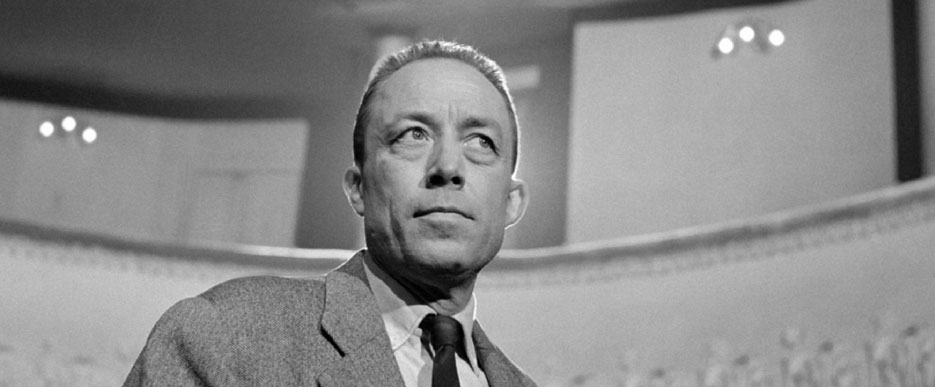
Albert Camus is regarded as one of the most influential novelists of the twentieth century. He is commonly known as the creator of the philosophical concept of the absurd, which I admire so much. To my mind, Camus is a genius, and he will always be a role model for me, and I’m sure for millions of other people too. When you read his novels, you can’t help but fall under his literary charms. Every character has power, and every scene is as meaningful as it is absurd. I know you may feel a bit confused, but please don’t be. I will help you see the problem of absurdity in a short and simple way.
Biography
 We have to start from the biography of Albert Camus as it helps us understand the writer’s personality and background. Actually, I was surprised to know that Camus was born in a poor Algerian family in 1913. His father passed away in the First World War when he was a little boy, so he was raised by his deaf mother. Despite the deprivation, Camus managed to earn a scholarship in a prestigious school and then studied philosophy at the University of Algiers. Soon he became a journalist for Alger Republicain newspaper.
We have to start from the biography of Albert Camus as it helps us understand the writer’s personality and background. Actually, I was surprised to know that Camus was born in a poor Algerian family in 1913. His father passed away in the First World War when he was a little boy, so he was raised by his deaf mother. Despite the deprivation, Camus managed to earn a scholarship in a prestigious school and then studied philosophy at the University of Algiers. Soon he became a journalist for Alger Republicain newspaper.
The next chapter of his life is tightly connected with Paris. Albert Camus got into the Resistance movement and became an editor of a secret paper called Combat. For many years, Gestapo was after him, and those harsh years were critical for shaping Camus as an individual and philosopher. The world saw his first novel called The Stranger in 1942. At that time, Jean-Paul Sartre, who was already a famous philosopher and novelist, noticed the talented young writer. Since then, they became the leading figures in the intellectual life of France.
Camus wrote a number of impressive works, but I want to take a look only at those that strike me the most. Thus, I would like to start with The Plague. It is something I have read like a million times and still open the author to myself from a new angle each time. The novel tells us about a city covered by a deadly disease. In fact, that is Camus’ way to put an allegory of German occupation of France, where the plague is a metaphor for Nazism and a totalitarian regime. The author studies human reactions to accidental evil and human solidarity with the indifferent universe in the novel.
The Rebel depicts the author’s views on the notion of rebellion in the context of opposition to
the revolution. He strongly criticized the revolution as it appeared to be a method for setting totalitarian regimes in Europe such as Nascizm and Stalinism. Being a pacifist, Camus advocated for an ethical and humanistic disruption to obtain justice. He also didn’t support the death penalty and the U.S. decision to drop a bomb on Hiroshima.
In 1960, Albert Camus tragically died in a car accident en route to Paris. Even though he lived for not a while, he managed to accomplish much and left a tremendous legacy. His concept of absurdity is still a highly disputable topic in many philosophical circles. So let’s see what is all the fuss about.
Does Life Have a Meaning?
The best example of the philosophy of absurdism is The Myth of Sisyphus, written in 1944 by Albert Camus. In this essay, the philosopher defined the absurd as the futility of a search for meaning in an incomprehensible universe, devoid of God or meaning. The author tried to find the answers to such questions: is a life worth living? Does it have a meaning? Is suicide the only option?
He compared the human urge for order and logic, pushing us to look for a higher meaning to Sisyphus, who was punished by Gods and had to roll a rock up the mountain forever, so it fell down the ground. Like Sisyphus, humankind questions the meaning of life only to find the answers that get us back to the beginning of the search.

So, Camus concludes that people have to embrace the absurdity of life and try to create their own meaning. Suicide is definitely not an answer. We have to put effort and develop resilience the same way Sisyphus did. According to Camus, Sisyphus was happy despite the pointlessness of his task. He had the courage to rise above his fate and keep living. Instead of committing suicide, he found the strength to work further and find happiness.
As you see, the philosophy of Albert Camus is not that complicated, but I guess it took him many long hours of work to come up with those novels so that we could taste his ideas like candy. However, it is only his point of view on life, and you may support it or not. But agree, he is a genius writer, isn’t he?





